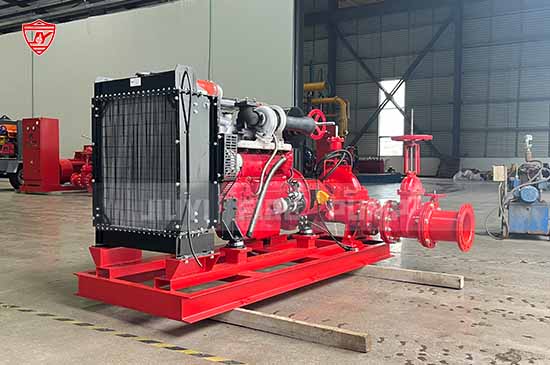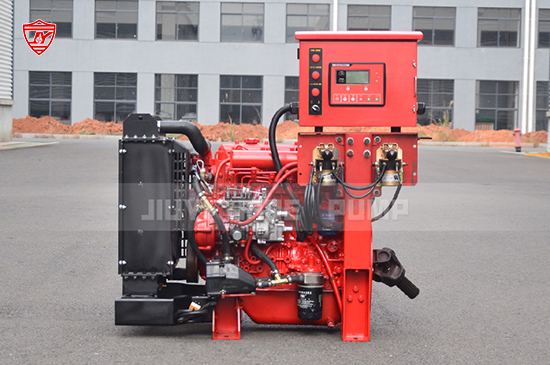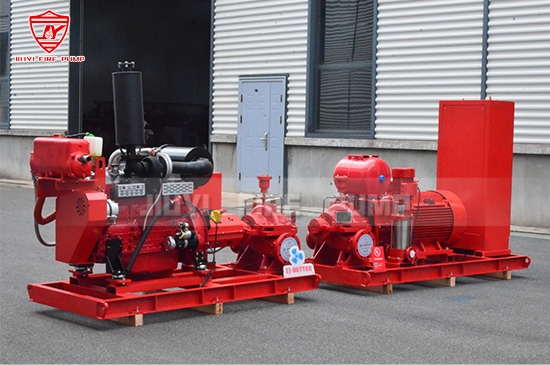In the fire safety industry, the reliability of every component in a diesel engine-driven fire pump is critical—especially the diesel injector pump. This component plays a vital role in controlling fuel delivery to the engine cylinders. When it malfunctions, it can compromise fire pump performance, delay emergency response, and increase maintenance costs. For facility managers, fire safety engineers, and maintenance teams, early identification of injector pump problems can make the difference between life and loss.
In this article, we’ll explore the most common symptoms of a bad diesel injector pump, how they affect fire pump performance, and what steps you should take to resolve these issues quickly.
A diesel injector pump is responsible for pressurizing and delivering the right amount of fuel into the combustion chamber at the correct time. It ensures efficient fuel atomization and combustion, powering the engine that drives your fire pump.
Because fire pumps often remain idle for long periods, yet must operate flawlessly in an emergency, the injector pump must remain in optimal condition. Contaminated fuel, lack of maintenance, or age-related wear can all cause injector pump failures.

One of the most noticeable symptoms of a bad diesel injector pump is difficulty starting the engine or failure to start at all. In diesel fire pumps, this symptom may present as:
Prolonged cranking before ignition
Inability to start even with a fully charged battery
Engine stalling shortly after starting
This occurs because the pump is unable to deliver sufficient fuel pressure to the injectors, especially when cold or under initial load.
When the injector pump cannot deliver fuel evenly or at the right pressure, the engine may run unevenly or produce misfires. Symptoms include:
Irregular engine vibrations at idle
Audible misfiring or knocking sounds
RPM fluctuations without throttle input
In a fire emergency, rough idling or misfires can delay fire pump activation, compromising safety.
Sudden changes in engine power output are often linked to inconsistent fuel delivery. A failing injector pump may cause:
Sudden surges in engine RPM
Unstable speed under constant throttle
Noticeable power loss under load
This is especially dangerous in fire pump systems, which rely on constant engine power to maintain required water pressure during a fire event.
Unusual exhaust smoke is a telltale sign of fuel system issues. Different colors indicate different problems:
White Smoke: Unburned fuel due to low injection pressure
Black Smoke: Excess fuel from over-injection
Blue Smoke: Burning oil due to faulty seals or injector wear
Black smoke in particular is often associated with injector pump timing problems or internal leakage.
While not always easily detected in fire pump applications (due to infrequent use), increased fuel consumption during testing can be a red flag. A malfunctioning injector pump may over-deliver fuel, leading to:
More frequent refueling
Incomplete combustion
Increased operational costs
Maintaining detailed fuel usage logs during weekly or monthly fire pump tests can help track this symptom.
Injector pump issues often cause distinctive engine sounds:
Ticking or knocking from the fuel system
Whining or grinding noises from within the pump
Irregular exhaust tone under load
These sounds typically arise when internal pump components are worn or contaminated by poor fuel quality.
Leaks around the injector pump housing, or visible signs of fuel in the engine compartment, can indicate:
Cracked pump housing
Faulty gaskets or seals
High-pressure line failures
Leaking fuel not only reduces pump efficiency but is also a fire hazard—particularly in emergency generator rooms or pump stations.
If your diesel fire pump engine is equipped with an ECU (Electronic Control Unit), a bad injector pump may trigger warning codes. In more modern engines, digital displays or controllers might alert operators to:
Injection timing errors
Low fuel rail pressure
Pump calibration faults
Always investigate such warnings immediately. A diagnostic tool compatible with your engine model can help pinpoint the issue.
If you suspect the diesel injector pump is failing, a comprehensive diagnosis should include:
Fuel Pressure Testing: Verifies pump output under load
Injector Balance Test: Measures injector performance consistency
Return Flow Test: Detects internal leaks or overflows
Pump Timing Verification: Confirms synchronization with engine timing
In some cases, removing the pump for bench testing is necessary.

In any facility—industrial, commercial, or residential—fire safety equipment must operate without hesitation. A malfunctioning diesel injector pump can cause:
Delayed fire pump startup
Inadequate water pressure during firefighting
Complete system failure in an emergency
These issues may violate NFPA 20 or insurance requirements and could lead to serious liability. Therefore, preventive maintenance and early detection are critical.
Poor fuel quality is a leading cause of injector pump failure. Use filtered diesel fuel and replace fuel filters regularly to prevent contamination.
Follow a strict maintenance schedule, including:
Monthly test runs
Annual engine overhauls
Timely replacement of fuel filters and seals
If your fire pump system has a diesel fuel tank, ensure it is clean and protected from water ingress, algae growth, and temperature swings.
Visual checks and diagnostic scans should be part of your routine inspection. Early detection of leaks, noise, or startup problems can prevent major failures.

Injector pumps have a finite service life—often around 5,000 to 10,000 operating hours depending on engine type and fuel quality. Consider replacement when:
Repairs are no longer cost-effective
The pump has chronic failures
Your fire pump system undergoes a major upgrade or compliance inspection
Always use OEM (Original Equipment Manufacturer) or UL/FM approved parts for replacements.
A faulty diesel injector pump is more than a mechanical issue—it’s a threat to your fire protection system’s reliability. Knowing the symptoms and acting early can prevent costly downtime, ensure compliance with NFPA 20 standards, and most importantly, protect lives and property in a fire emergency.
As a manufacturer of high-quality diesel fire pumps, we emphasize regular testing, premium component selection, and professional maintenance support. If you're experiencing any of the above issues or are unsure of your fire pump’s condition, contact our technical team for expert guidance.